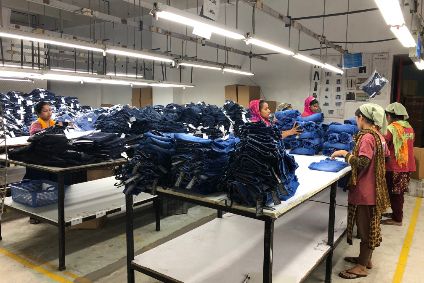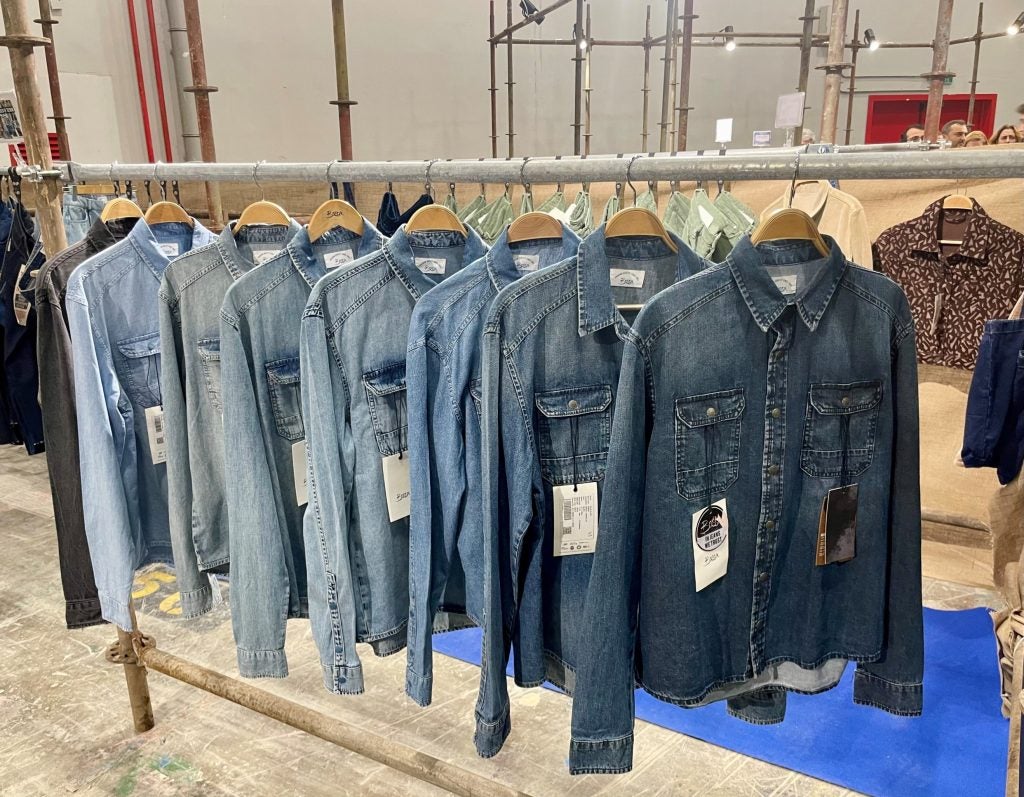
The Covid-19 crisis exposed the inequity of power that exists between brands and the supply chain – but has also provided a window of opportunity to fix it, according to a new report that sets out steps to build an ethical denim and jeans industry for the future.
Commissioned and authored by the non-profit Transformers Foundation, the report on ‘Ending Unethical Brand and Retailer Behavior – The Denim Supply Chain Speaks Up’ set out to identify why brands, retailers, and importers felt they could walk away from their commitments to denim suppliers during the Covid pandemic.
Based on conversations with suppliers, supply chain experts, governmental organisations and activists, it also offers actionable steps and solutions for all stakeholders to correct this power imbalance and build an equitable and ethical denim and jeans industry for the future.
“Our main hope is to inspire, through the denim industry, other sectors to enact long term change,” Marzia Lanfranchi, intelligence director of the Transformers Foundation, said on a webinar introducing the report on Monday (26 October).
Smaller retailers and brands are more ethical
See Also:
One of the key takeaways is that suppliers would prefer to set up business relationships with smaller, independent buyers rather than large multinationals.
How well do you really know your competitors?
Access the most comprehensive Company Profiles on the market, powered by GlobalData. Save hours of research. Gain competitive edge.

Thank you!
Your download email will arrive shortly
Not ready to buy yet? Download a free sample
We are confident about the unique quality of our Company Profiles. However, we want you to make the most beneficial decision for your business, so we offer a free sample that you can download by submitting the below form
By GlobalDataSo, post-pandemic, diversification is key and they should avoid reliance on one large customer making up the majority of orders. Moreover, suppliers should be looking at working with independent and privately-owned brands that are not public and/or owned by a holding company or private equity firm.
“My biggest selection act was to renounce work with the fast retailers,” Alberto Candiani of the Candiani mill in Italy told the report’s authors. “The pattern I see is that large corporates are acting [worse] than independent brands.”
For Sanjeev Bahl, founder and CEO of sustainable denim manufacturer Saitex, the founder’s vision and mentality says a lot about how a brand or retailer will behave towards its partners.
“He or she is the one who really inculcates the philosophy of the business. As the organisation grows larger and turns dependent on investors, the goalposts start shifting. Capitalism comes to the forefront, with environmental and social justice taking the back seat.”
Overcapacity issue in denim
The report also highlights an overcapacity issue across the denim industry.
“There is more denim made than consumed, there are more garment factories than necessary – it creates this sort of auction for everything and many of the brands love that and use one against the other to squeeze the bottom, conditions, terms whatever out of the end so all the financial risk is given to suppliers, because one of the things that is negotiated is open terms,” Andrew Olah, Transformers Foundation founder, said on the webinar.
“All these things were impacted during Covid and in a lot of cases the brands don’t need what they’ve ordered. They give it back to the supplier and it becomes the supplier’s problem and they don’t have the financial structure to deal with it.”
Overcapacity also means suppliers take on unethical and distressed clients.
Jose Royo of Tejidos Royo told report authors he doesn’t say no to risky customers, “because the customer can change your factory situation. Suddenly one of these guys can do a big order. Maybe we didn’t make any money, but at least you’re paying the fixed costs of the company.”
Brands, retailers and importers also leverage over-production to engage in counter-sourcing, in which they take a sample of new, innovative fabric from a top-tier mill, and then hand it to another mill for copying, to create competition and lower the price of the fabric.
“Effectively, trying to leverage the overcapacity in the industry to lower prices by copying intellectual property of other mills,” one mill told report authors. “In some cases, we have received 20 fabrics from one customer to counter source. Even reputable brands engage in this behaviour.”
And all the financial risk is pushed down to suppliers.
“Multinational conglomerates have used their power to chip away at the amount of financial responsibility they have over the production of jeans to almost nothing,” the report states.
“They don’t put down a deposit on orders. Instead, they sign a contract with a promise to pay for the order within a certain time period after the goods are shipped or delivered. Suppliers then take this promise and order materials and pay the workers who produce the denim and jeans.”
According to a special report by the Better Buying initiative, based on supplier feedback in the fourth quarter of 2019, out of 784 suppliers:
- 40% reported payment terms of over 60 days;
- 2.4% reported payment terms of over 120 days or more;
- 31% reported the buyer they rated paid on average 26 days late.
“Unwise” behaviours
“To me, certain behaviour patterns are not so much unethical as they are unwise,” said Avedis Seferian president and CEO of US-based WRAP (Worldwide Responsible Accredited Production). “How can a major retailer, on the one hand, tell its factories it doesn’t have the money to pay for these orders, and on the other hand, issue a dividend to its shareholders?
“The finance people are looking only at a certain set of information, making a decision based on that information, and not seeing the bigger picture. Organisations and buyers who have done a better job over the past few years of integrating social compliance directly into their sourcing decision process are making much wiser choices.”
Other factors that have led to a “broken denim supply chain” according to the report include brands refusing to own their liabilities – that is, not being accountable for the raw material orders placed on their behalf by suppliers, and their tendency to charge markdowns and chargebacks to suppliers. Suppliers also have no legal power, with most problems starting at the contract signing stage.
During Covid, many brands cancelled their orders citing the force majeure clause, allowing them to unilaterally cancel orders at any time for reasons that were out of their control. But the definition is so vague as to include almost any circumstance.
“Suppliers signed these lopsided contracts for the same reason they make all of the other concessions: all the power rests with brands, and an industry overcapacity means there’s always another supplier willing to sign it,” authors state.
The report also notes voluntary commitments are failing because no organisation holds brands and retailers accountable.
The Transformers Foundation proposes several structural short and long-term solutions, through which it hopes to push the denim industry – and inspire the wider fashion industry – to share profits and risks fairly across the supply chain.
The three over-arching goals are to rectify the power imbalance between denim and jeans suppliers on one side, and the brands, retailers and importers (BRIs) on the other. Create consequences for unethical and/or illegal behaviour from BRIs. And provide support and a space for suppliers to voice their concerns.
• Create a brand, retailer, and importer (BRI) ethical code of conduct.
• Facilitate the formation of a short-term supplier working group to provide a unified voice of denim suppliers.
• Facilitate the formation of a long-term, independent, multi stakeholder group to connect suppliers to independent legal counsel as soon as issues arise around unethical buyers and contractual terms.
• Provide continued education on best-in-class practices.
For the denim fabric and jeans manufacturing supply chain, the advice is to:
• Join the temporary working group for suppliers.
• Adopt/endorse the Transformers Foundation’s ethical code of conduct for buyers.
• Ensure your voice is heard and contribute your valuable expertise and experience to any legislative debates and industry events.
• Treat other suppliers and their employees with the same high standard of respect and transparency that they ask for from BRIs.
While brands, retailers and importers (BRIs) are urged to:
• Own your liabilities. Take responsibility for any fabric, trims, and units ordered to fulfil a contractual purchase order.
• Establish long-term relationships with suppliers and factories.
• Support development programmes at your suppliers.
• Go beyond the simple supplier list to include first, second, and third-tier suppliers and profile each supplier.
• Support transparency and due diligence legislation.
• Create an executive track for CSR professionals and embed them in the boardroom.
• Embed an ethical approach into the buying team’s Key Performance Indicators.
• Improve your forecasting or take responsibility for the financial impact, instead of asking for discounts from the supplier.
• Join NGOs and labour unions on binding agreements.
• Be honest with consumers about the challenges the company is facing and the choices it has to make.
“The supply chain now has the opportunity to work together to make changes they could never make alone,” Olah said on the webinar.
“This report identifies and illuminates the many problems that are fixable with collaboration and shared intentions not only from factories and mills, but from NGOs, governments, brands, retailers, importers, and the people who love to wear denim. This report is just a first step, you’ll be seeing more from us in the months ahead.”







